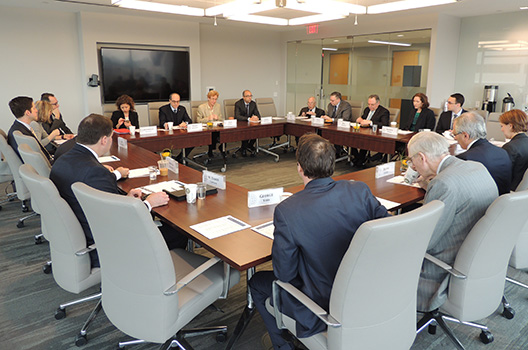 On March 3, 2015, the Global Business and Economics Program hosted a small off-the-record breakfast roundtable to discuss the challenges and opportunities for the agriculture sector from the Transatlantic Trade and Investment Partnership (TTIP). Attendees included leading policymakers from both sides of the Atlantic, industry representatives, and civil society actors. Paolo De Castro, a Member of the European Parliament Rapporteur on TTIP for the Parliament’s Agriculture Committee, opened the discussion.
On March 3, 2015, the Global Business and Economics Program hosted a small off-the-record breakfast roundtable to discuss the challenges and opportunities for the agriculture sector from the Transatlantic Trade and Investment Partnership (TTIP). Attendees included leading policymakers from both sides of the Atlantic, industry representatives, and civil society actors. Paolo De Castro, a Member of the European Parliament Rapporteur on TTIP for the Parliament’s Agriculture Committee, opened the discussion.
The need for a strategic and pragmatic approach to the negotiations that emphasizes the common interests and goals of both the EU and the United States emerged as a key point of agreement. Both sides agreed that TTIP offers an immense opportunity for the agriculture sector both in Europe and the US. Even though agriculture accounts for only a small percentage (12.8%) of trade between the EU and the United States today, participants stressed the strategic importance of agricultural trade when considering the transatlantic partners’ role in preventing scarcity and promoting global food security.
The impact that a comprehensive free trade agreement could have on food scarcity in the world, was a recurring theme throughout the breakfast. For instance, biotechnology, which allows farmers to grow more crops with less resources, was mentioned as a critical policy area for the US and EU to cooperate on into the future. Attendees reiterated that TTIP must be an ambitious agreement with high environmental and consumer protections standards. These improved standards would, in turn, also benefit developing countries that are not part of the agreement, but who exporting to the EU or the United States. Moreover, TTIP, will help to shape the global rules on trade and influence the makeup of future trade agreements.
The coming months are likely to prove pivotal for TTIP’s future. At the roundtable there was a general consensus that controversial topics in the negotiations pertaining to agriculture, such as the protection of geographic indicators and rules on genetically modified organism, should not prove insurmountable given the common responsibilities and interests of both the United States and the EU. The Atlantic Council will continue to provide a forum for policymakers and industry representatives to facilitate dialogue between all sides as the TTIP negotiations move ahead.
